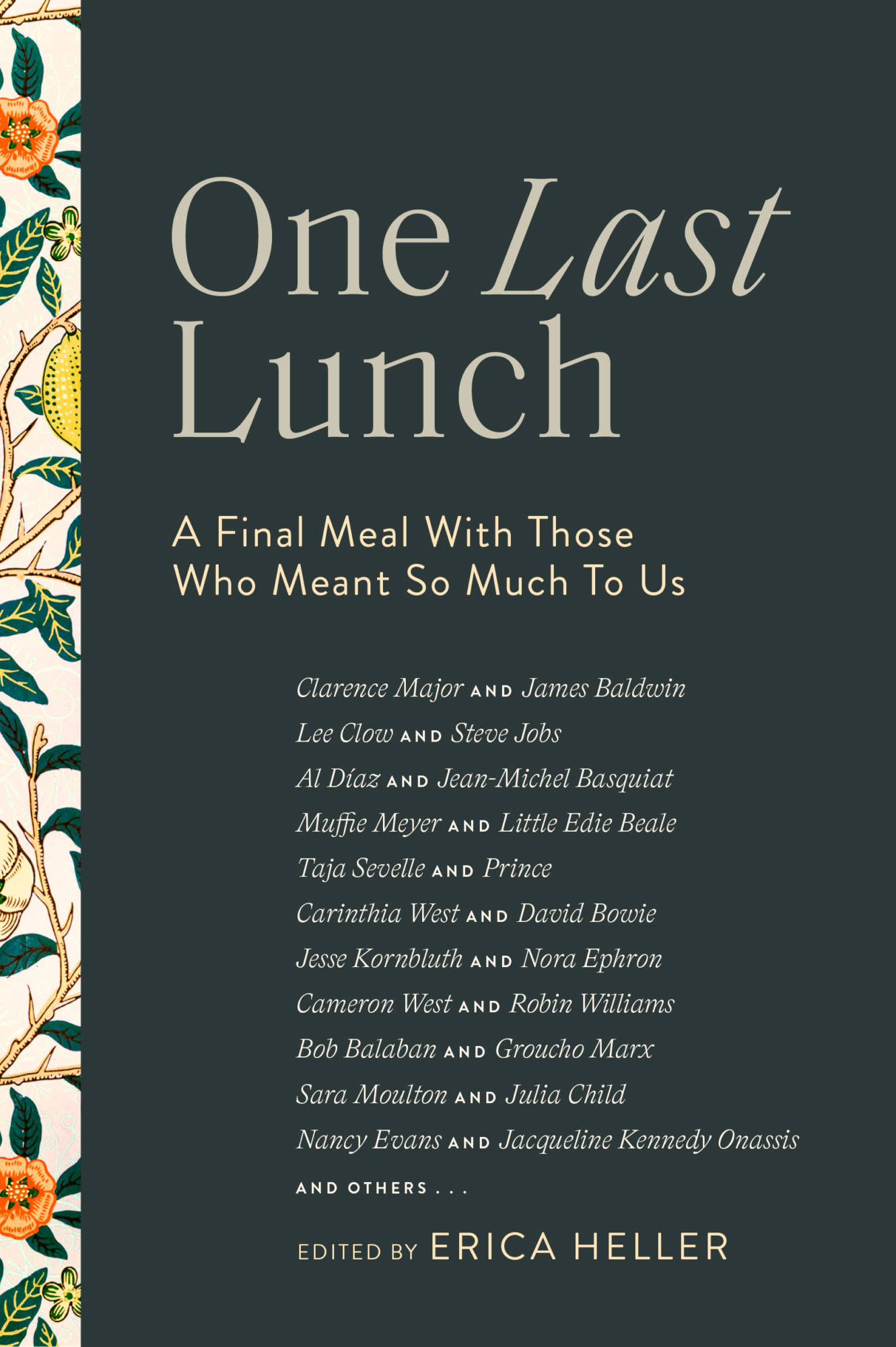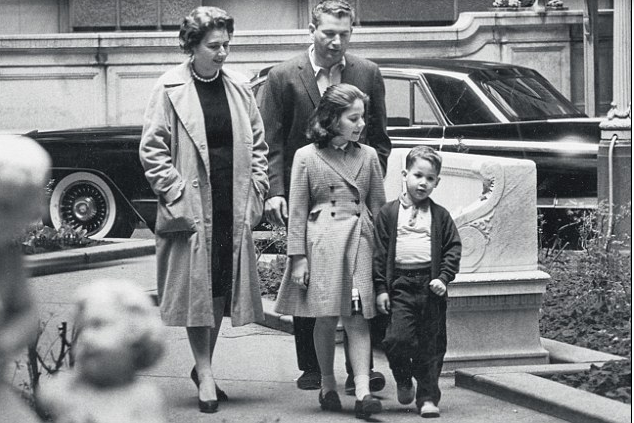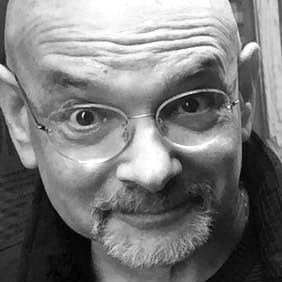
I just finished reading the best book I’ve read, so far, all year (and I have read some really great ones since January): One Last Lunch: A Final Meal With Those Who Meant So Much to Us edited by Erica Heller is a masterpiece. Erica and I are not related (although we worked together on 300 Ways To Say No To a Man and I once lied to a reporter that her father, Joseph Heller, author of Catch-22, was my uncle — and now I’m glad that was not true). She is also the author of the memoir When Yossarian Slept Here.
This is one of my favorite interviews with an author/editor who conceived a stunningly moving, empathy-, pathos- and bathos-filled volume based on the idea that everyone would want to have one last meal with someone important, meaningful and emotionally resonant in their lives. What a brilliant concept; what a difficult task to accomplish, which Erica did so damn well. Although not every imaginary memory touched me in the same way (and none of them read like the others) yet I was glued to every story. There was intense heartbreak, pure joy and total mind fuckery.
If nothing else (and there is a lot else) the construct is fascinating. Where do these dead lunchmates come from? Heaven? Hell? Purgatory? The unknown hereafter? The predicted afterlife? And how are they constituted? As they were when they died? When young? Or as an idealized version? The way that each contributor plays with the form and designs the format and creates the menu is a multi-layered, wonderful reading experience.
Of course, it made me consider who my first and only last lunch would be with. The rules are: The author, whoever it is, has to have known the person in some intimate or casual way. There must be some intellectual or emotive touchpoint. I realized that there was no one currently in the grave that I wanted to share a meal with or to who I needed to say one last thing. Although there were lots whose afterlives I wanted to explore. A contradiction? Maybe. I guess it’s a flaw in some aspect of my character that I’ve never had that kind of deep feeling about anyone whose is now gone . . . except, maybe, my grandparents from whom I’d like to know more about my parents. But that’s another story.
There is still half a Summer left. A Covid-19, #BLM, pre-election summer of anxiety, stress, sadness, and pain. You may think that One Last Lunch could exacerbate those feelings. You’d be wrong. For me, it was life enhancing and beautifully done. By the way, don’t miss the episode with Peter O’Toole and daughter . . . . what class.

Photo of Erica Heller's family: Erica, mother Shirley, father Joesph, brother Ted in 1962.
Steven Heller: One Last Lunch is such an incredibly engaging, wish-fulfilling idea. An open door for truth, fiction, aspiration, contemplation. As I read it, I consider who my partner would be. What would we talk about? Would there be resolution or confusion? You begin and end with your father, Joseph Heller, with whom you had a difficult relationship. Did the book derive from your desire to see him one last time for such a short time?
Erica Heller: Absolutely not. It actually came about from missing my mother, gone 25 years, and wishing I could see her again. As I think my two lunches in the book indicate, a lunch with him would be difficult (as always) and ultimately futile.
SH: Yes, I can’t imagine that kind of callousness that he exhibited (all your life). I was particularly taken by how some of your writers jumped right in. Kirk Douglas did not beat around the bush. He wanted his father’s parsimonious pride for the amazing life Kirk (born poor in upstate New York as Issur) made for himself. What was the reaction of the subjects you asked to write these brief heartfelt dramas? Did anyone see it as opening a can of worms?
EH: First, let me tell you a bit about the process, which involved me making a list of lunches I’d love to have, and then waking up each day for more than a year, sending out more than one hundred queries a day. In 99% of the cases, I had no way whatsoever of directly reaching them and really, no expectation that I’d ever be able to find people close to these (mostly) icons, who would be ready, willing and able to bring us into their own private world with their dining partner. Sometimes it took ten people to finally get through to someone who agreed to do it. Many of them were reticent, not because they were reluctant to divulge the intimacy that had been shared. Most of them worried that they couldn’t write. And of course, I worried about that too. There was a lot of negotiating, convincing, and yes downright begging. Then it was okay, I got the people to write the lunches, but what would I get from them? Most of them aren’t writers. It was a colossal gambit. Looking back now, I think I must have been mad to even attempt to put this book together.
SH: I was quite impressed by the skill, beauty, and honesty of many texts. In fact, I looked forward to reading the different styles. Jesse Kornbluth’s encounter with Nora Ephron was solid writing, of course, but interesting for various reasons, not the least because she was not one of his intimates. Were you surprised by some of the choices people made?
EH: Well, it didn’t work that way. I picked the people, not the writers. I chose Nora Ephron and then set about finding someone who knew her even vaguely, had an interesting story to tell, and who actually agreed to write it. It’s interesting that you picked Nora. I can’t tell you how many people I reached out to who were “afraid” to write about her. Apparently, she is still a sainted, worshipped, icon with legions of loyal followers. I was never one of them.
SH: I can see wanting to have lunch with Jesus, which was a delightful read. But some of your writers were not so delightful or delighted with the results of their lunch dates. Other than the proscription that they had to somehow know their lunch companion, were there any other constraints?
EH: Not really. I wanted them to unleash their imagination and they certainly did. My only constraints, really, were to try to make the lunches as detailed and real as possible so that the reader felt almost as if he/she were eavesdropping at the next table. I wanted to know about the bowl of pickles on the table or the sizzling spareribs. I also didn’t want the writers to end up with a piece really about them, glorifying themselves or even subtly bragging about their relationship with the person eating lunch with them. Luckily there wasn’t much of that. And no, not everyone was ‘delighted” with the lunches they depicted (including me), but they wrote truthfully, honestly. Sometimes it was very raw, but at least it was real.
SH: It worked. I was engrossed in that way. It was hard to read your own contributions. I guess, in your own case, it is hard to follow in the footsteps of a famous father, mother, or sibling. The respective lunches between Bellow and Cheever sons revealed that strain. How difficult was it to get them to commit themselves to this?
EH: It wasn’t difficult at all. They had a lot to say. They are each their own grown-up person and my feeling was that they had both let go of the notion of “following in Papa’s footsteps” and if the lunches were “strained,” it was because the fathers were difficult, not the sons’ lives because of them.
SH: Which lunches impacted you the most? And which lunches did you not manage to get, that you would have liked to have read?
EH: I would have killed for Marilyn Monroe, Mike Nichols, Elizabeth, but despite my tireless attempts, those lunches were not to be. Which lunches impacted me the most? Do you really think I’m crazy enough to divulge that? Each one affected me profoundly. Malachy McCourt (eating with brother Frank) had me laughing out loud. Many had me weeping. With many, such as Lee Clow’s (illustrated) lunch with Steve Jobs, I was just bowled over with the boundless imagination involved. Then again, what else would I get from half of the Apple team after creating so many legendary Apple campaigns?
SH: Knowing the illustrator Elwood Smith for decades, I was touched that he had lunch with (or rather you chose) his art teacher from Alpina, Michigan. Of all the people in the world. . . Was that kind of personal yet rare encounter what you wanted?
EH: Honestly, I wanted a little bit of everything and somehow, that’s what I got. Prince, in the same book as Elwood’s art teacher (another amazing series of illustrations) I felt, made the book more relatable to people. After all, not everyone got to have lunch with Jackie O. or Saul Bellow while they were alive. This art teacher changed Elwood’s life. That was good enough for me.
SH: I also was taken by those who set-up the situations. A few people had to be reminded they were dead. A few could care less. Most of the dead accepted that there were privileges in death. Did you anticipate these various ways of addressing the assignment? Did you have a fixed or fluid idea of how this scenario would play out?
EH: I had absolutely no fixed idea of how anyone would complete this task. How could I? All relationships are complicated and I couldn’t imagine how the writers would address anything. Variously attributed to Robert Benchley, Morrie Schwartz and Mitch Albom is the quote: “Death ends a life, not a relationship,” and this book is a testimonial to that. (I prefer Benchley.)
SH: Maybe I missed it (or wanted to miss it) but I did not read many deep regrets or apologies coming either from the dead or living. I guess, that would have been my first instinct?
EH: That surprised me, too. But the writers let the lunches lead them and none of them went there. I was also hoping that some deceased parent would say to the son or daughter they were lunching with, “Oh and by the way, you have a brother and a sister you never knew about,” but you can’t have everything.
SH: I presume you don’t care to tell me what your ultimate favorite was. But for me it was the Grey Gardens lunch. It was so real I forgot what I was reading (I was there). So, what was your most surprising discovery, let’s say?
EH: My most surprising discovery, I guess, was to find how many of these grown-up, accomplished “children” still sought the approval of their parent. I mean, Kirk Douglas, for God’s sake!
SH: I can’t imagine that you would do a sequel, although I see a lot of people now wanting to contribute, if only to find out the truth from someone in my life who was not altogether honest when alive. But is there anything that did not materialize for you through this book?
EH: Not really. All the different variables came in one lunch or another. One lunch was with a suicide, another was with an accomplished writer who had lost her beloved grandson at 6. That one had me in puddles every time I read it. Still does.
SH: For me it was the lunch with Robin Williams. Did you come away from this with some kind of catharsis?
EH: No. I wish I did. My written lunches were painful to contemplate and to write but the experience, in order to be as authentic as possible, required that I really did spend time with my father—in my imagination. Regrettably, these lunches were no more cathartic than our real lunches used to be. I don’t miss them.

